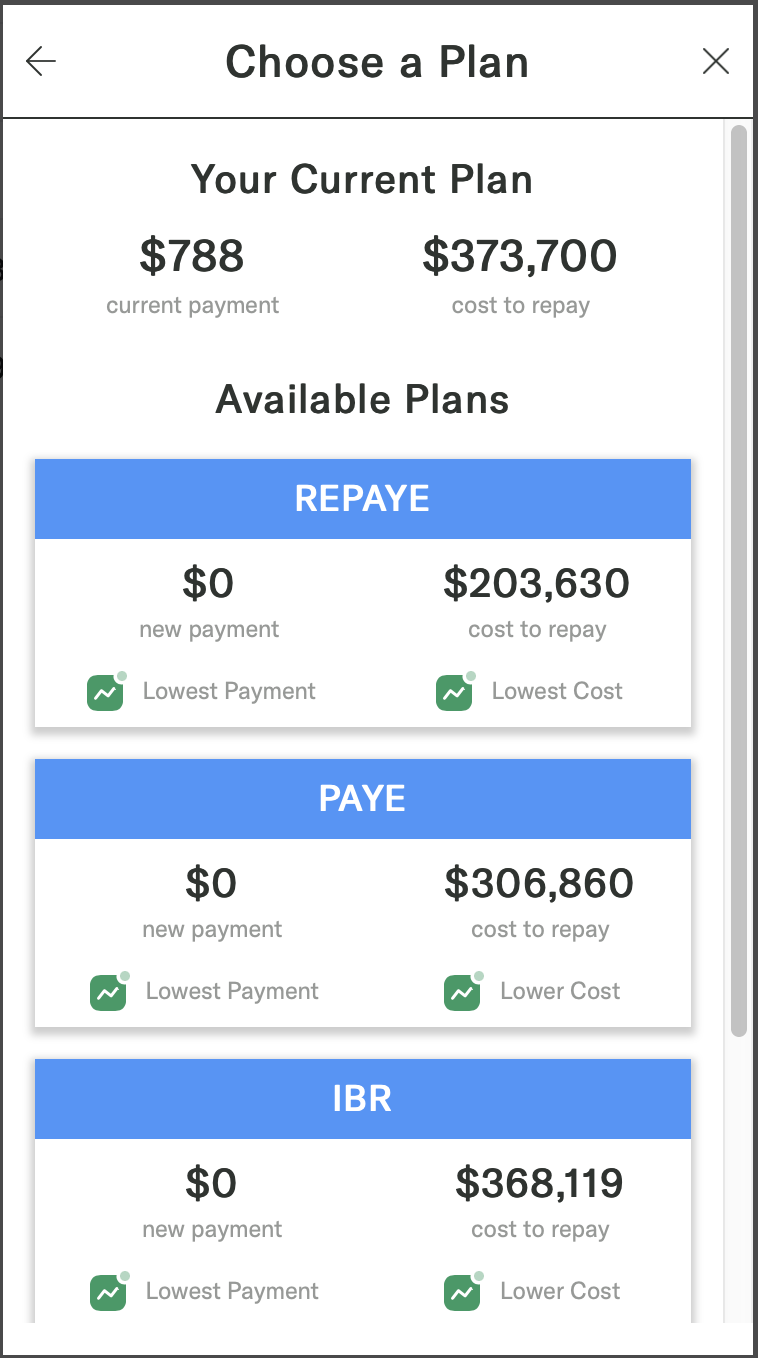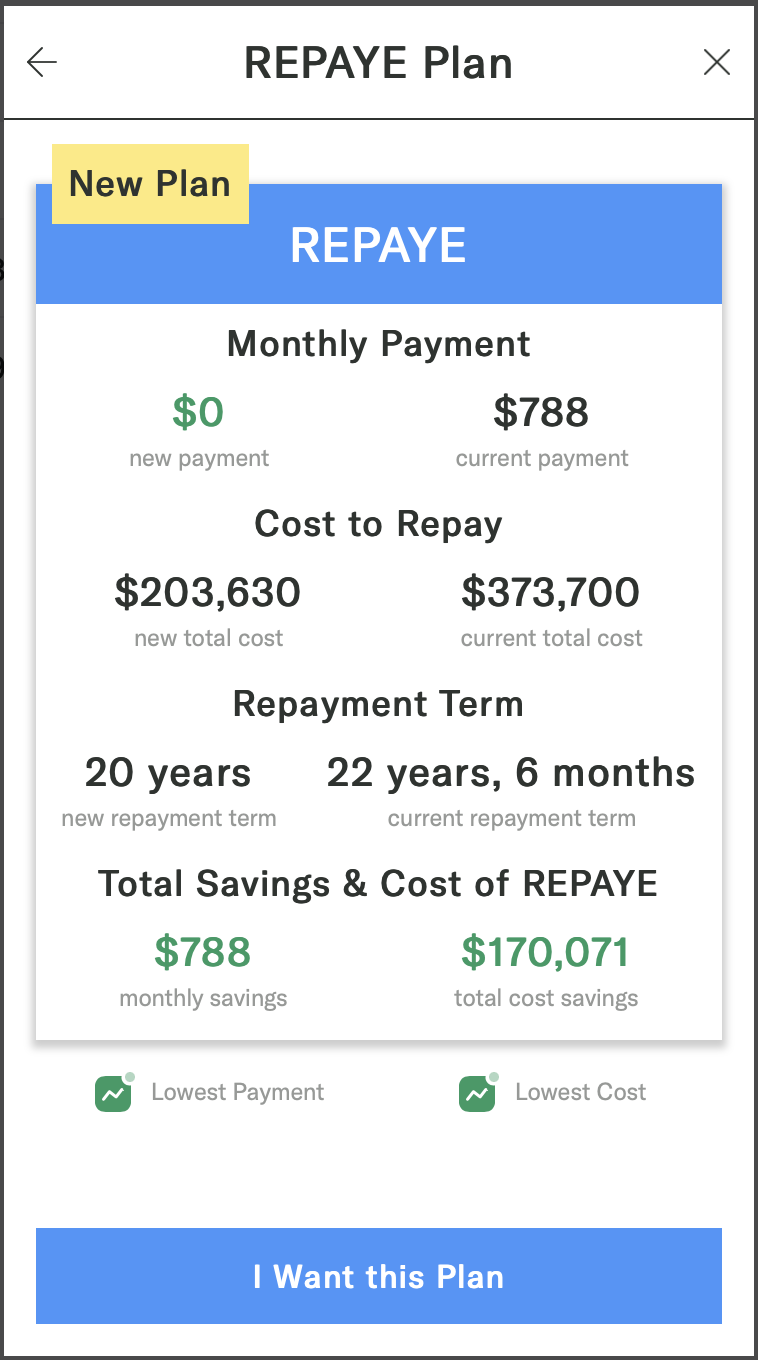Assess
Help borrowers compare eligible Repayment Plans with Nexus.assess
After you've linked servicer accounts to build a loan portfolio, it's time to offer your Borrower an Assessment. While you can use our API and build your own Assessment experience, Nexus.assess makes calculating and presenting a comparison of Repayment Plan options as easy as a function call.
Nexus pre-fills information we know about your borrowers
To make things easy for your borrowers, we will pre-fill information required to perform an Assessment. This means if you're using the API, or if a borrower has used Nexus before, we'll fill in information that's been saved before—like filing status, family size, and adjusted gross income. We'll still present these steps to the user so they can confirm or correct the information as they proceed through the workflow.
Calling Nexus.assess
Nexus.assessWhen invoking Nexus.assess, Nexus expects to receive a single options object as a parameter. This options object allows you to specify two callbacks:
onSuccess—a function to execute when the workflow completes successfullyonExit—a function to execute when your borrower exits the workflow or an error occurs
// Assuming you have a button your Borrower can click to Assess
let assessButton = document.querySelector('#nexus-assess-button')
// Attach click handler to invoke Nexus.assess
assessButton.addEventListener('click', e => {
Nexus.assess({
// the function to call when borrower is done
onSuccess: assessSuccess,
// the function to call when borrower quits or error occurs
onExit: assessExit
})
})

Nexus.assess presenting a list of eligible IDR plans.
onSuccess callback
onSuccess callbackWhen your Borrower finishes the Nexus.assess workflow—which occurs when they click the I Want this Plan button after reviewing and selecting a Repayment Plan—Nexus will execute the unary callback function you provide to the onSuccess option when invoking Nexus.assess.
function assessSuccess(response) {
// maybe congratulate your borrower on choosing a plan that saves $$$
console.log('Assess complete')
console.log(response)
}
onSuccess response
onSuccess responseYour onSuccess callback function should expect a single object with additional information you can inspect. The Nexus response will contain three properties:
message—astringvalue indicating the workflow succeededresult—anobjectthat provides additional details and may change over time. Will have at least three properties:borrower—anobjectthat provides additional details on the borrower for whom the Nexus workflow was performed.uuid—the unique Payitoff UUID that identifies this borrower for API and Nexus calls
current_plan—a summary of their current Repayment Plan detailsrequested_plan—a summary of their chosen Repayment Plan details
status—astringvalue. Will always be"complete"for anonSuccesscallback.
Example onSuccess callback response for Nexus.assess
onSuccess callback response for Nexus.assessIn the example below, you can see who your Borrower is, what their current_plan looks like, and how their requested_plan compares. If you plan to call Nexus.enroll next, you'll want to grab the requested_plan.name value to supply to Nexus.enroll as their chosen plan.

Nexus.assess presenting a more detailed comparison of a plan to the user's current repayment situation. Clicking I want this Plan results in the onSuccess response below.
{
message: "Assess complete.",
result: {
borrower: {
uuid: "4a3f2ae8-b72c-4db6-b46e-f76f72fcc2f7"
},
current_plan: {
cost_difference: null,
current: true,
lower_monthly_payment: false,
lower_repayment_term: false,
lower_total_cost: false,
lowest_monthly_payment: false,
lowest_repayment_term: true,
lowest_total_cost: true,
monthly_difference: null,
monthly_payment: "2621.73",
name: "CURRENT",
repayment_difference: null,
repayment_term: 6,
total_cost: "3051.15"
},
requested_plan: {
cost_difference: "5579.69",
current: false,
lower_monthly_payment: true,
lower_repayment_term: false,
lower_total_cost: false,
lowest_monthly_payment: true,
lowest_repayment_term: false,
lowest_total_cost: false,
monthly_difference: "2621.73",
monthly_payment: "0.00",
name: "REPAYE",
repayment_difference: 198,
repayment_term: 204,
total_cost: "8630.86"
},
workflow: "assess"
},
status: "complete"
}
If you're relying on Nexus to create borrowers for you, you will want to save the
borrower.uuidthat is returned so you can make API calls on behalf of your borrowers.
onExit callback
onExit callbackWhen your Borrower exits the Nexus.assess workflow—which occurs when they cancel or otherwise dismiss Nexus without completing the workflow—Nexus will execute the unary callback function you provide to the onExit option when invoking Nexus.assess.
function assessExit(response) {
switch (response.status) {
case "incomplete":
// User quit the widget.
// Maybe save that they quit so you can prompt them to finish later.
break;
case "illegal":
// You asked to perform a workflow your borrower isn't ready for.
break;
case "error":
// You supplied an invalid Nexus key and/or Borrower UUID,
// or an error occurred in Nexus/Payitoff.
break;
}
}
onExit response
onExit responseYour onExit callback function should expect a single object with additional information you can inspect. The Nexus response will contain three properties:
message— astringindicating what occurred to trigger the exitresult—anobjectthat provides additional details and may change over time.borrower—anobjectthat provides additional details on the borrower for whom the Nexus workflow was performed.uuid—the unique Payitoff UUID that identifies this borrower for API and Nexus calls
workflow—an optionalstringvalue indicating what workflow a borrower was in when they exited Nexus, if they decided to bail out. Should always be present whenstatusis"incomplete".
status— astringvalue that is one of the following values:"error"— Nexus received an invalidnexus_key,uuid, or encountered some other error"illegal"— You have attempted to perform an action for a borrower that is not allowed, or for which the borrower is not currently ready"incomplete"— Your borrower quit the widget without completing the requested workflow
Example onExit callback response for Nexus.assess
onExit callback response for Nexus.assessIn the example below, you can see a user did not complete linking servicers and chose to exit the widget before they made it to the actual Assessment flow.
{
message: "You didn't complete your assessment.",
result: {
borrower: {
uuid: "9e0cc73c-d450-44ea-857a-3030d3674572"
},
workflow: "assess"
},
status: "incomplete"
}
If you're relying on Nexus to create borrowers for you, you will want to save the
borrower.uuidthat is returned so you can make API calls on behalf of your borrowers.
Updated over 2 years ago